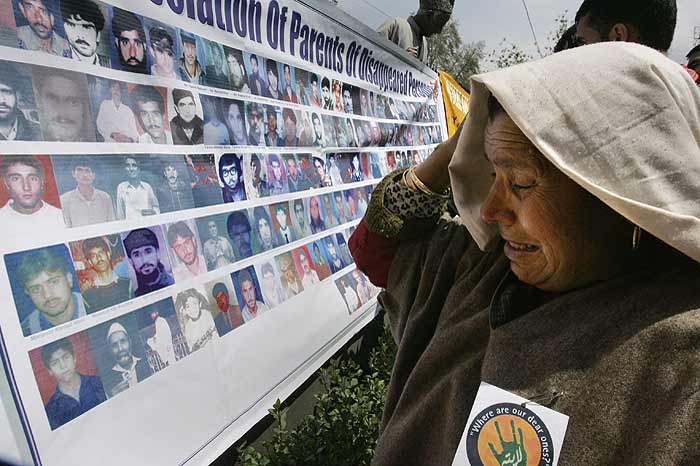Sahar-ul-Nisa Haroon
Kashmir, world’s living heaven and a valley of gushing rivers and lakes nestled in the heart of the majestic Himalayas is whirling now to be a nightmare for those parents who lost their children in the battle of continued existence and self-determination. Enforced disappearances those were; abduction at the hands of those in authority, a very common practice in Kashmir, to which at least 8000-10,000 people, mostly youth, have been subjected to since 1989.
Can it be explained how a mother felt when her son “disappeared” from the frame of her life, what it meant for a father who brought him up with all difficulties for his old age ease , not knowing that his life would turn out otherwise. Feel their pain, the perplexity of the fear that their children could be dead, and yet hopeful that they will be back.
The valley is now recognized as the “prison” or the “city of bunkers”. Enforced disappearances are the biggest torture a person undergo as it involves a mixture of hope and uncertainty. It gives a half hope of life and an uncertain fear of death. Amnesty international has categorised it as the grave crime against humanity. It is a heinous practice because it does not accept Habeas Corpus and violates the fundamental rights of the people, security rights, and dignity right of a person. On the one hand India is claiming Kashmir as the integral part of India and on the other hand it is not providing Kashmiris the basic human and fundamental rights.
On February 6, 2007, International Convention for the Protection of All Persons from Enforced Disappearance (ICCPED) was signed by 57 states but still the process is on. Ask the people who have lost someone very special, not lost them completely and left with a hope of returning.
Enforced disappearances not only have had the worst effect on the sufferers but it has created a high wave fear of being included in the long list of the missing. People in valley are engulfed in a sense of insecurity. Think over it; what about a family when their dear one goes missing; no information about him or her, whether alive or dead. It really torments the psyche of the families of the disappeared.
Moreover, the psychological effect of disappearance is high in case the person was the sole earner in the family as it brings economic crisis to the family which ultimately are accompanied by the agony, uncertainty, trans-generational trauma and post-traumatic stress disorder. In fact the family’s survival is threatened.
‘Half-widows’
The main targets of enforced disappearance are male but female bear the direct consequences of this inhuman practice. It has given birth to another phenomenon of the ‘half widows’. Unaware whether their husbands are alive or dead, lives and social status of these women become uncertain. There are half widows in Kashmir today who have been waiting for 13 years and yet have not remarried. The whole suffering is due the culprits in the authority; but the culprits cannot be brought to the book as the government of India, refuses to grant necessary sanction to prosecute under article 6 of the Armed Force (Special powers) Act.
Enforced disappearance has also affected the children of the state. This common phenomenon has left the children lost, traumatized and expressionless. The children in the valley have seen the bloodshed from their childhood which bring in them the perennial pain, emptiness and anxiety. The anxiety slowly and steadily has taken the form of severe depression which choked the whole expression of the child.
‘Gloom, only gloom’
Who is responsible for spoiling the budding childhood of children in Kashmir? Who is responsible for this incomplete picture where father is missing, mother is half widow and earning is from hand to mouth. Enforced disappearance is the seed of various problems which has engulfed the future of Kashmir. The uncertainties of life hamper the mental health and well-being of people in Kashmir. There is a mixed feeling of hope and fear left behind for the families of disappeared people and above all a deep mistrust among people about the authorities.
The immunities provided by the government have made authorities more exploitative. The AFSPA is the leading cause for the enforced disappearance which gives rise to fake encounters and custodial deaths. In September 2011, 2,700 unmarked graves spanning over 55 villages were unearthed. This added to the state of mental trauma and dilemma among families about the safety of their dear ones. These unidentified graves are in itself a living evidence of atrocities a Kashmiri is facing with.
Kashmir is a place where live people cannot speak but where graves have voices to speak up the stories of their exploitation. No doubt these stories are being ignored but somewhere they are making their position in the history.
(The author is a scholar at Aligarh muslim university. Views are personal)










